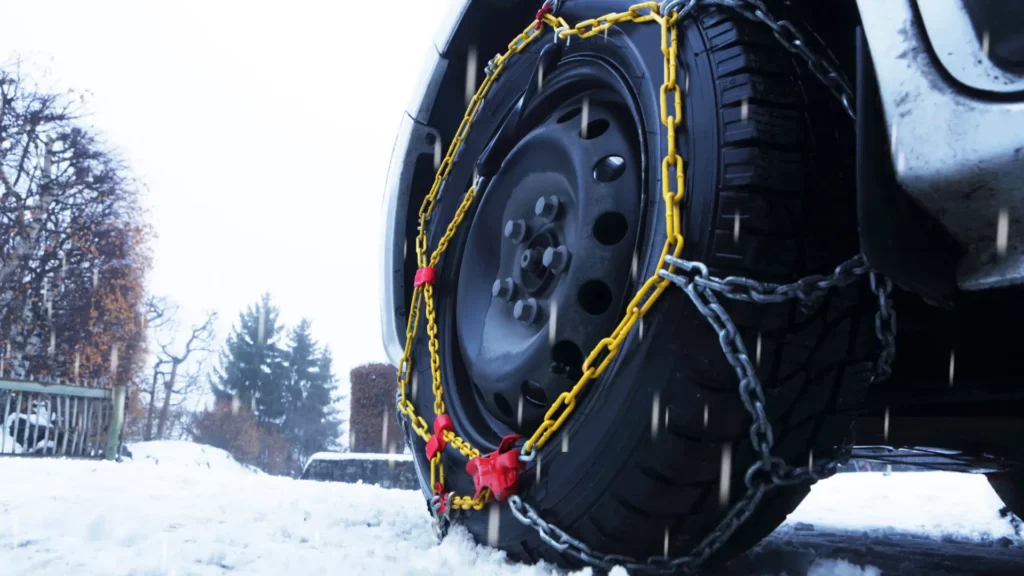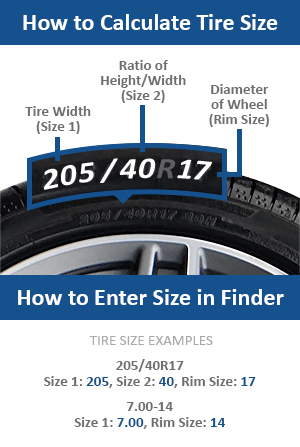
Updated May 2020
Most every state in the U.S. has laws pertaining to the use of tire chains or snow tires. These laws dictate when you can, should, and absolutely must use tire chains, as well as when it’s not permitted. Some states will post signage or declare a snow emergency to indicate that tire chains are needed. Other states leave it up to the driver but indicate that chains may be used if conditions warrant.
(Disclaimer: Although we try to keep this page as up-to-date as we can, we can not guarantee that a state’s chain law has not changed since our last page update. Always confirm the regulations on your state’s official site)
Search By Tire Size

How do I find my tire size?
States With Basic Laws
The following is a list of states that have a similar tire chain law, stating:
- Alabama
- Arizona
- Delaware
- Georgia
- Iowa
- Illinois
- Indiana
- Kansas
- Louisiana
- Maine
- Michigan
- Mississippi
- New Jersey
- New Mexico
- North Carolina
- North Dakota
- Oklahoma
- Rhode Island
- South Carolina
- South Dakota
- Texas
- West Virginia
- Wisconsin
*Some states have date restrictions for when you can/cannot use tire chains, as well as restrictions on the size of the chains and the type of vehicle that may use them. Check with your state’s transportation department for specifics.
Special Guidelines
Other states have more specific laws regarding tire chain and snow tire use. The list below outlines each state’s specific guidelines.
California
No specific dates for chains, but signs will be posted when chains are required.
Colorado
Commercial vehicles traveling on certain roads must carry chains from Sept 1 to May 31.
Connecticut
Studded tires & non-skid devices may be used from Nov 15-April 30.
Idaho
No specific restrictions, it is advised to avoid it unless necessary.
Kentucky
May not be used unless the road is ice-covered or vehicle has an ice shoe at least 6 in wide. Limit on diameter & spacing.
Massachusetts
Permitted from Nov 1-May 1.
Maryland
Required when a snow emergency has been declared, not allowed on vehicles weighing more than 10,000 lbs.
Minnesota
Permitted when road conditions call for it. Studded pneumatic tires not allowed on state-registered vehicles.
Montana
Permitted Oct 1-May 1, not mandatory unless notices are posted. Specific regulations for studded tires.
Nebraska
Metal studs only permitted November 1-April 1. School buses, mail carrier vehicles, and emergency vehicles are permitted year-round.
Nevada
Required on all vehicles over 10,000 lbs when requirements in effect. Studded tires permitted between Oct 1-April 30.
New York
Required when a snow emergency has been declared.
Ohio
Only permitted between Nov 1-April 1, except for public safety or school bus.
Oregon
Required on vehicles over 10,000 lbs when SNOW ZONE signs are posted.
Pennsylvania
Permitted between Nov 1-April 15, restrictions on the size of tires or studs.
Tennessee
Permitted Oct 1-April 1, specific regulations on a percentage of wire or other material that comes in contact with the road.
Utah
Between Nov 1-March 31, if signs are posted, vehicles must have chains or snow tires.
Washington
Signs marked “chains required” will be posted. On certain routes, chains must be carried from Nov 1-Mar 31.
Wyoming
Signs will be posted indicating when chain laws are in effect, and must use adequate snow tires or chains.
States Without Tire Chain Laws
Some states have no tire chain laws at all. These include:
- Florida
- Hawaii
- Missouri
- New Hampshire
- Vermont
- Washington, D.C.
Passenger & Industrial Chains
